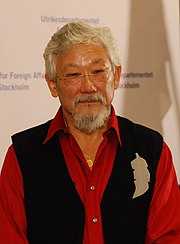 |
| David Suzuki in 2009 |
I loved this documentary. The issues involved are intense, painful and devastating for patients, and fascinating for science. All the issues were presented in a fair and balanced non-sensationalist and non-conspiratorialist way.
I would have liked to see a more rigorous explanation of *why* anecdotal evidence is so low on the evidential scale, on what the placebo effect really is, since the patients interviewed clearly had not an inkling of understanding, but I also realise that it is darned hard to explain this to the general public. I've been trying for years to do exactly that, and I'm just not succeeding. That pains me, but reality is often painful, and that's not a valid reason for denying it.
While this is not limited to "liberation therapy" specifically, the documentary also clearly showed what the potential is for damage by non-scientific ways of thinking in combination with social media.
"What's the harm?" asks someone. The harm -or the benefit, as the case may be- is, what we will see 20, 30 years or a century from now, when we see how many people have been helped by this non-cure (we already know for a fact that "liberation therapy" is not a cure) and how many have been harmed.
Unfortunately, as the documentary shows, even without knowing the benefits yet, we already know part of the harm: the hopefully temporary derailment of genuine research and the search for therapies that work.
In my opinion, this documentary demonstrates that we need better education. People should learn from the youngest age possible why scientists do what they do and how they do it. These rules have not been created by lazy bureaucrats and selfish politicians who enjoy torturing people.
These rules have been established by scientists to protect themselves against drawing false conclusions and as a way to ensure that science and medicine are not contaminated with the seemingly plausible but utterly false and harmful.
This is the only way to keep the heroic medicine and quackery of the past from harming us again.
While this documentary is necessarily superficial in its explanations because of time constraints, it does a masterful job at pointing out the issues and explaining why they matter while not -even for an instant- forgetting the deeply human aspects of the tragic situations that bring people to irrationality.
The documentary can be watched online on the CBC's website.
-----
This page was last updated on 14 February 2012

My local paper did a piece on liberation therapy. The story would have left you shaking your head. The reporter clearly needed a lesson in how medical research works.
ReplyDeleteI know doctors who refuse to talk to certain reporters as they think these reporters are ignorant. If one patient claims a benefit, that is good enough for these reporters to publish a glowing report on the therapy in question.
Liberation therapy is a very painful case indeed, and in my view, it is a practical example of what I tried to illustrate with the Monty Hall problem: that simple "common sense" just doesn't cut it in many cases. When we have a cold, we declare it cured when we "feel good again", but conditions such as MS can't be dealt with that way, and if we do it anyway, because it is "common sense", we are deluding ourselves.
ReplyDeleteWell i've had the treatment and the results were amazing.
ReplyDeleteCCSVI is real.
This fantastic vision of honesty and truth you say exists in the scientific world is manipulated by the companies handing out the research grant monies.
Scientific Fact: Most Humans can be greedy, self full filling entities.
Scientific fact: All scientists are human.